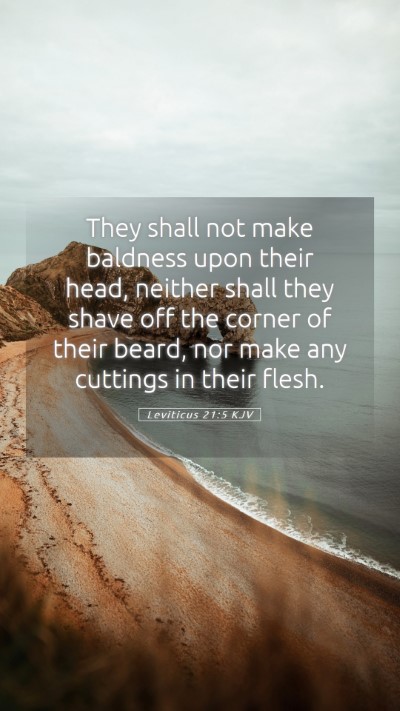Bible Verse Meaning of Leviticus 21:5
The verse Leviticus 21:5 states, "They shall not make baldness upon their head, neither shall they shave off the corner of their beard, nor make any cuttings in their flesh." This commandment was given to the priests of Israel and carries significant implications in terms of law, symbolism, and cultural practices.
Understanding Scripture
This verse serves as a guideline for the priestly class, reflecting not only their physical appearance but also their spiritual status. The prohibitions against baldness, shaving the beard, and cutting the flesh are deeply rooted in the customs of the time, conveying a message about holiness and the separation of the priests from pagan practices.
Historical Context
In ancient Israel, specific external marks were associated with mourning and pagan rituals. The command to maintain a particular appearance—and to refrain from actions that could symbolize death or mourning—emphasized the priests’ duties to remain holy and set apart for God’s service. These requirements also fostered an identity distinct from surrounding cultures that practiced such acts as part of their worship or rituals.
Commentary Insights
- Matthew Henry's Commentary: Matthew Henry emphasizes that the priests were meant to reflect the glory of God in their appearance. Their adherence to these regulations demonstrates respect for their sacred responsibilities.
- Albert Barnes' Commentary: Albert Barnes points out that the prohibitions against physical alterations were a way to maintain dignity in the priesthood. Barnes also notes that these restrictions were intended to prevent association with idol worship.
- Adam Clarke's Commentary: Adam Clarke elaborates on the cultural significance of the practices mentioned. He discusses that in the surrounding nations, such actions often symbolized mourning or were part of religious rituals aimed at appeasing gods or spirits.
Application of the Verse
For modern-day believers, the essence of Leviticus 21:5 can be understood as a call to maintain a standard of holiness. While the specific external practices may not apply in the same way today, the underlying principle of setting oneself apart for God remains relevant. This passage incites reflection on how personal conduct, including appearance and behavior, influences one’s representation of faith.
Cross References
- Exodus 28:36-38: The instructions regarding the priestly garments emphasize holiness and the importance of fitting conduct.
- Leviticus 19:27: This passage echoes the call to maintain specific grooming standards and sets the tone for distinguishing between the children of Israel and other nations.
- 1 Peter 2:9: In the New Testament, believers are referred to as a royal priesthood, emphasizing the ongoing relevance of living in a manner that reflects God’s holiness.
Conclusion
In summary, Leviticus 21:5 serves not only as a historical commandment for the priests of Israel but also as an enduring reminder for individuals about the importance of holiness and distinction in conduct. Understanding and applying biblical teachings like these to our lives can be facilitated through Bible study groups, online Bible study resources, and comprehensive Bible study lessons that provide insights into scripture analysis.


